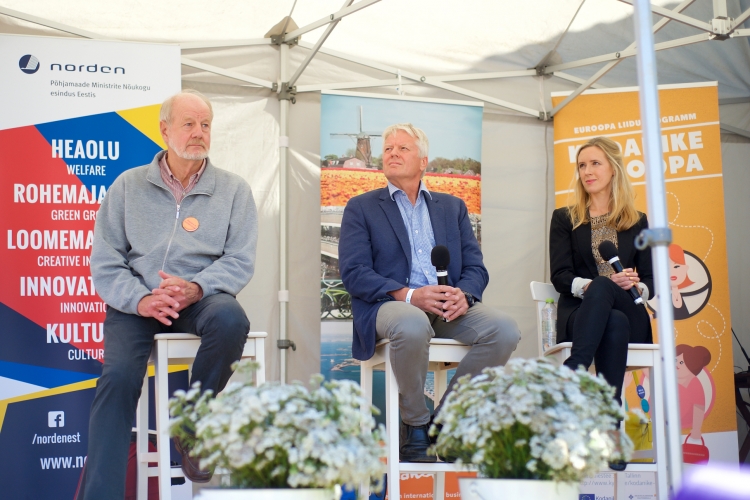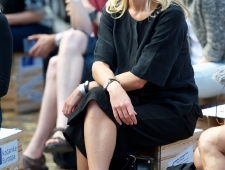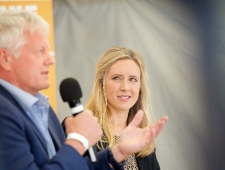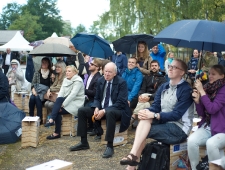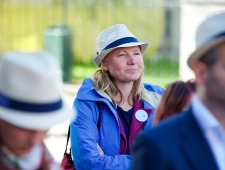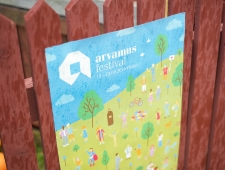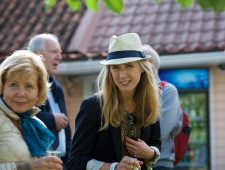Does the happiness reflected in the Nordic welfare model really represent real life and what is it like in specific countries? For Russell, the Nordic model represents a social welfare and security network, which is also important in terms of the way of thinking. During the year he has been living in Denmark, he has seen how people fight for being able to spend more time with their family, take parental leave and enjoy life.
According to Joar Vittersø, people in the Nordic countries have realised way earlier than anywhere else something that social psychologists have been studying for 30 to 40 years, constantly discovering something new. Namely, that people are ultra social creatures for whom solidarity is important. According to him, an important aspect in the Nordic social welfare model is that if the family does not care for its member, the state does.
Lindroth pointed out that Nordic people believe that social issues can be resolved. Emancipation is important to them, gender equality, for example.
In Russell's opinion, everything depends on the decisions that the country makes. For example, he points out the 80s, when Denmark decided to make design its priority, and today it is a landmark which Denmark is known for. The same could apply to the introduction of the welfare model in different countries. He hopes that children will still be raised in a spirit of confidence in the schools of Denmark and feminism will still be supported.
Vittersø brought out two aspects, when talking about Nordic welfare: Firstly, for example, even before the arrival of oil wealth, equality was still an important principle for Norway that has now been carried on. Secondly, when talking about happiness, we should look below the primary surface and examine social relationships – and, in their case, he considers trust to be the most important. According to him, it is easily possible to be happy if essential needs are satisfied and it is possible to think about other matters.
In response to the question, what we could talk about regarding the Nordic countries 10 years from now, Lindroth said that it would be beneficial to create a public arena, where you could discuss the current state of affairs freely without emotions. It is necessary to have a discussion where we could use new words, which would cover this new situation – the state of multiculturalism in Sweden's case. The emotion-free debate arena should also be extended to other Nordic countries and Estonia.
The tradition of the Nordic Political Week or Opinion Week began nearly 50 years ago, when in the summer of 1968, then Education Minister Olof Palme, standing on a truck trailer, had a direct discussion with the people in Gotland. This was the start of the annual event in summer in Gotland, the Almedalen Political Week. The event, which has become ever so popular among politicians, opinion leaders, experts and journalists, has inspired other Nordic countries, Baltic countries and the rest of the world to organise similar debate weeks or days. In Estonia as well, where the Opinion Festival has become an important venue for collecting ideas and exchanging opinions.
Watch the video of the discussion on Youtube
See pictures of the Nordbuss trip to the Festival of Opinion Culture, discussion and the subsequent reception in the Roosa maja courtyard:
- Arvamusfestival 2016 arutelu "Kui tugevad on Põhjamaad? Piisavalt, et olla õnnelikud?!"
- Author: Jana Laigo/Norden.ee
- Arvamusfestival 2016 arutelu "Kui tugevad on Põhjamaad? Piisavalt, et olla õnnelikud?!": Joar Vittersø ja Helen Russell.
- Author: Jana Laigo/Norden.ee
- Arvamusfestival 2016 arutelu "Kui tugevad on Põhjamaad? Piisavalt, et olla õnnelikud?!"
- Author: Jana Laigo/Norden.ee
- Arvamusfestival 2016 arutelu "Kui tugevad on Põhjamaad? Piisavalt, et olla õnnelikud?!"
- Author: Jana Laigo/Norden.ee

